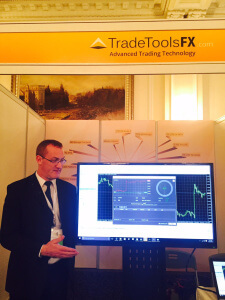It’s an exchange, Jim, but not as we know it! Op Ed on where OTC FX is headed
FinanceFeeds CEO Andrew Saks-McLeod on what will really happen should the end of the OTC era draw near – and it will not involve expensive exchange fees and infrastructure costs. Just a few months ago, a group of senior executives from institutional technology providers in New York such as NASDAQ OMX and CME explained to me […]

FinanceFeeds CEO Andrew Saks-McLeod on what will really happen should the end of the OTC era draw near – and it will not involve expensive exchange fees and infrastructure costs.
Just a few months ago, a group of senior executives from institutional technology providers in New York such as NASDAQ OMX and CME explained to me that there will be a time, rather imminently, at which the US government rules that all OTC FX must move onto exchanges.
Following that discussion, I spoke with some retail FX technology vendors with a background in exchange infrastructure engineering, who countered the conclusion of the big US exchange firms by explaining that the magnitude of exchange membership fees, along with the monthly cost of paying a third party (in this case a physical exchange venue) for infrastructure and the clearing costs would be so punitive for a small firm that it would not be viable.
This may well be the case if the entire trading infrastructure upon which electronic exchanges operate is viewed in today’s context, that being the large Chicago-based institutional venues which clear and price the order flow generated by North America’s financial giants, as well as the proprietary shops.

Talking to many retail FX providers over the past two years, there has been something of a dichotomy. Those outside the US which had once had presence there, pulled out, citing non-viability of operation due to large capital adequacy requirements post Dodd-Frank Act, and the imminence of exhange trading requirements, however the domestic firms such as FXCM, Interactive Brokers and GAIN Capital have all maintained a vast retail presence in their home country.
I would like to suggest that the US retail firms have a different approach to those from the European side of the pond, and one of those approaches is the way that an exchange must be looked at if retail FX is forced onto venues.
Having conducted some detailed research into this matter, I can see that in the near future, the US government will likely take steps to move retail electronic trading onto exchanges, but they will not be the type of exchange that exist now.

Instead, the exchanges will either be new, or separate entities owned and operated by the large exchange technology firms such as IntercontinentalExchange and CME, or they will be virtual and have no physical venue, and will be seperate to the expensive and institutional-geared exchanges that currently exist.
A number of senior executives in this industry concur with me that it is possible that a virtual exchange, with hosting that can be replicated across variable locations (for example, can be deployed on servers near the offices of brokerages that would use them), could come into existance to provide very affordable exchange-based trading.
What does the regulator really want?
In the US, there is a considerable regulatory interest in ensuring that traders trade against and with other traders, rather than traders trading with or against an FX company, and as far as the powers that be are concerned, the only way to create that kind of free market is to put an exchange in place and let traders process their orders via the exchange which puts the FX broker and the client in the same standing, rather than one against the other.
For retail FX traders, there is no need to process orders through expensive physical venues. Instead, trades can be processed via virtual, government-authorized pseudo-exchanges that the prices can be pulled from should that be required.
Real exchanges, operated by large US companies, aimed at retail customers with minimal cost
This week, at the FXIC Forex Industry Conference in Shanghai, China, I witnessed a world first. It came in the form of TradeToolsFX’s complete integration of binary options into the MetaTrader 4 platform as extra instruments that can be traded directly from within the MetaTrader 4 alongside spot FX, via Cantor Exchange.
The exchange fee for this? Absolutely nothing. Instead of paying subscriptions and membership fees, brokers simply register themselves as an IB with the National Futures Association (NFA), provide their clients with the MetaTrader 4, on which in this case binary options are traded by the end user, and the end user deposits the funds directly to the exchange. This changes the entire focus and shows that in this case, traders can execute futures contracts from their MetaTrader 4 platform, from home, on a retail basis, via one of the world’s largest exchange firms, without the costs associated with institutional exchange traded products, despite the institutional ethos of this system and its providers.

This is one example of how a modern exchange can accommodate retail customers in a very effective manner, and there is no reason why spot FX may not follow suit. Singaporean futures firm Phillip Capital has been forging relationships with American exchanges and is now looking to attract retail customers in the US for exchange-traded futures contracts.
Many firms are looking at CFDs as a means of diversifying into new asset classes aside from currencies, however, most companies have no means of pricing and clearing CFDs, therefore should a type of virtual exchange system materialize, there would be no need to do so because all assets would be priced by the exchange provider and spot transactions could be carried out on a peer to peer basis (rather than a peer to broker basis) without having to go down the CFD route.
Currently, Divisa Capital is working on integrating its prime brokerage solution into otcXchange, which although not an actual exchange, performs a very similar function, and, following a discussion with one of the firm’s senior executives in the US, he considers it likely that a system along these lines will become a requirement at some point in the near future.
Congruently, working in conjunction with venues is on the mind of other prime brokerages, too. Advanced Markets & Fortex explained to FinanceFeeds at their offices in Boston, Massachusetts last month that the company has an interest in working closely with Asian exchanges in order to provide wholesale order flow to Chinese firms via relationships with exchanges.

As with weather fronts, newly released movies, and the latest gadgets, Europe will likely follow the lead made by America, and therefore should a framework along these lines be implemented in the US and be an NFA requirement, the European regulators may look to take a similar step, and perhaps include it in MiFID II which is the directive that has been drawn up to cover trading infrastructure in Europe.
One thing is for sure: If this was to happen, there would be no more dubious execution practices, and no more laisse faire risk management procedures, as they would not be possible if all was transparent and companies and customers stood on the same ground.
All photography copyright Andrew Saks-McLeod









